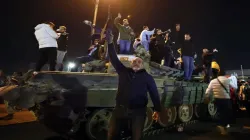Syria crisis: President Bashar al-Assad’s rule ends as rebels storm Damascus, people celebrate
President Bashar al-Assad's 50-year rule over Syria ends as rebels storm Damascus, prompting widespread celebrations and uncertainty about the country's future.

In a shocking turn of events, claims of rebels infiltrating Damascus and President Bashar al-Assad fleeing the country have marked the unexpected end of the Assad family's 50-year rule over Syria. On Sunday morning, people took to the streets to celebrate the fall of the government, with footage from Syrian state television showing a group of individuals claiming that President Assad had been ousted and all prisoners released from jail.
Assad leaves capital
Rami Abdulrahman from the Syrian Observatory for Human Rights confirmed to the Associated Press that President Assad fled Damascus early on Sunday morning. Residents reported hearing gunfire and explosions throughout the city. Iranian state TV, a staunch ally of Assad's regime during the war, also confirmed that Assad had left the capital, citing Qatar’s Al Jazeera news network, although no further details were provided.
Celebrations erupt across Damascus
In the early hours of Sunday, crowds gathered in Damascus' squares to celebrate, chanting anti-Assad slogans and honking car horns. In some areas, celebratory gunfire could be heard. Soldiers and police officers abandoned their posts, while rebels stormed the Ministry of Defense headquarters. The situation unfolded rapidly, marking a pivotal moment in the Syrian conflict.
Local reactions: A sense of liberation
Umar Daher, a 29-year-old lawyer, expressed his disbelief, saying he could not fathom the reality of the situation. He shared how his father had been killed by security forces and his brother imprisoned, with no knowledge of his fate. Daher described Assad as "a criminal, a dictator, and an animal." Another resident, Ghazal al-Sharif, condemned the Assad family, saying, "Shame on the president and the entire Assad family."
Police headquarters found abandoned
Reports from Associated Press journalists described the main police headquarters in Damascus as deserted, with doors left open and no officers in sight. Other footage showed empty army posts with Assad's posters on the ground. The sounds of "Allahu Akbar" echoed from mosques for the first time since 2018, signalling the arrival of rebel forces within the city.
Assad’s inner circle distances itself
After a years-long siege, Syrian forces had retaken control of the outer regions of the capital in 2018. However, reports now suggest that government-aligned media such as Sham FM radio confirmed that Damascus International Airport had been evacuated and all flights were halted. Rebels also announced their takeover of the Saidnaya military prison north of the capital, freeing prisoners in the process. Meanwhile, former allies of Assad's government began distancing themselves from the regime.
Media’s role in Assad's regime questioned
Pro-government newspaper Al-Watan wrote that Syria was witnessing the beginning of a new chapter and expressed gratitude that more bloodshed had been avoided. It also stated that media workers should not be blamed for publishing government statements, as they were simply following instructions. The paper remarked that it became clear that many of the official reports had been false.
Rising prices and uncertainty
A resident informed the Associated Press that many shops in Damascus had closed, and those that remained open were running out of essential items like sugar. Some vendors had raised prices threefold, taking advantage of the situation. In response to the growing uncertainty, the United Nations announced that it was evacuating nonessential staff from the country as a precautionary measure.
Global reactions, future uncertainty
Amid the chaos, U.S. President-elect Donald Trump commented that the United States should avoid military intervention in Syria. He stated on social media, “This is not our fight.”
The rebellion’s unexpected surge
The rebel offensive began unexpectedly on November 27, when gunmen seized control of Syria's largest northern city, Aleppo, and the country’s fourth-largest city, Hama. The Syrian Civil War, which has already claimed nearly half a million lives and displaced millions, has reached a pivotal moment, as Syria’s future remains uncertain. The war has forced millions of Syrians to flee the country, seeking refuge in neighbouring countries like Jordan, Turkey, Iraq, Lebanon, and Europe.